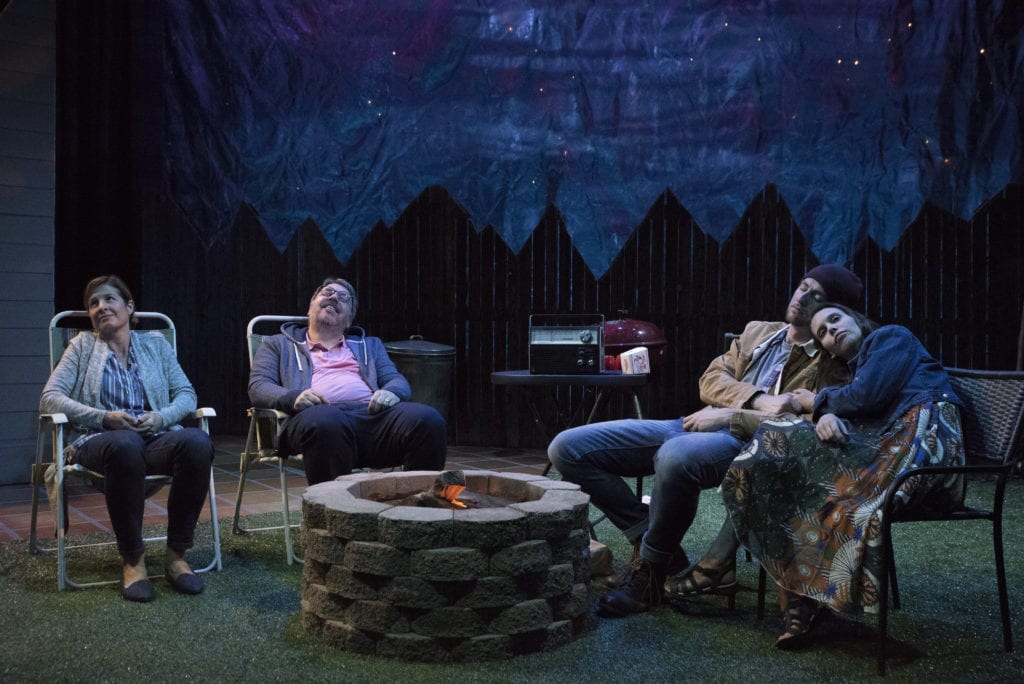
The Realistic Joneses Ain’t Realistic, but It Sure Is Interesting
by Juliet Wittman for Westword Magazine (Read the original.)
At the beginning of The Realistic Joneses, currently mounted by the Boulder Ensemble Theatre Company in a regional premiere, we do seem to be watching a realistic play. Bob and Jennifer Jones are seated in their garden, engaging in a conversation that signifies a complete lack of communication and understanding between them. Jennifer, smiling and appearing to revel in the peaceful garden, wants this communication, but surly Bob doesn’t. Or perhaps he does but can’t figure out how to do it. The two are soon joined by new neighbors John and Pony, also surnamed Jones. They bring a bottle of wine and all kinds of bright observations, but they’re completely daft — particularly pretty, flighty Pony.
At this point, you think you suspect where this show is going, because you’re accustomed to plays about middle-class couples who clash, bond, engage and reveal long-held grievances and secrets. Besides, Will Eno, whose plays have been compared to theater of the absurd and also to Samuel Beckett, says right in the title that this one’s realistic.
But it isn’t — or is only in the external details. There’s no story, no narrative arc, never an event or bit of dialogue that leads to its own reasonable conclusion. Normally, when guests in a drama bring over a bottle of wine, the wine gets consumed. If a character shows sexual interest in another to whom they’re not married — and particularly if the two get sexy — there should be consequences. If we learn, as we do, that Bob has a terminal disease, we ought to see him get sicker. Or try to prevent getting sicker. Or at least talk about his sickness. And then when it turns out that John has the exact same disease — well, I don’t know what we’re supposed to do with that. Conclude that the two characters are in some strange sense one person? Wonder about an epidemic? Not a single thing that we expect to happen in this play happens. Or if something does, it’s in such an oblique and elliptical way that we don’t know how to understand it.
The dialogue is discursive, contradictory. Topics arise and are dropped. Not only is there no story, but you sense that Bob, Jennifer, John and Pony aren’t actual people. I’ve seen two of Eno’s plays — Modern Muse, a wonderful company now disbanded, put on a production of Thom Pain (based on nothing) in 2007; Benchmark showed Eno’s Wakey, Wakey in January — and both are essentially monologues that, like The Realistic Joneses, have to do with mortality and how identity is constructed. Both provide a sense of deep, inexpressible currents beneath the flow of words. Reviewing Thom Pain, I wrote that the protagonist appeared less a human being than a vortex in the center of a swirl of language.
The four people in The Realistic Joneses don’t feel like vortices, but they do seem to exist primarily in the words that blow around them like autumn leaves. And those words — make no mistake — are worth your attention. Not because of their depth and truth: I’d like to say I felt rage, sorrow, insight, terror throbbing beneath the dialogue, but I didn’t. Yet, paradoxically, my failure to be moved didn’t prevent a deep, fascinated involvement. I laughed a fair amount. I felt alert and stimulated. I thoroughly enjoyed the wit and intelligence of what I was seeing.
There’s also an interesting tension in the fact that although — as written — Bob, Jennifer, John and Pony don’t feel like real people, they are played by living, breathing actors, each of whom must find their own way to embody this quirky, off-kilter world. In Michael Morgan (Bob), Emily Paton Davies (Jennifer), Casey Andree (John) and Kate Parkin (Pony), director Stephen Weitz has hit the casting jackpot. I’d love to have been in on their conversations, hear their interpretations of the words they were required to say, listen to their feelings about motivation and meaning, because the resulting performances are vivid, and these actors work in beautiful synchronicity. Morgan is sullen, sarcastic, impenetrable and bewildered as Bob. Paton Davies makes Jennifer the most apparently normal of the foursome, kindly and smiling until her frustrations burst through. Andree provides a long-legged, sort of hippie-ish and mildly radiant John, though the radiance does get dimmed again and again. Parkin plays flittering-fluttery Pony with beautiful, almost translucent style.
This is exactly the kind of smart, stimulating, contemporary drama we’ve come to expect from one of the area’s finest companies.
The Realistic Joneses, presented by the Boulder Ensemble Theatre Company through November 17, Dairy Arts Center, 2590 Walnut Street in Boulder, 303-444-7328, betc.org.
